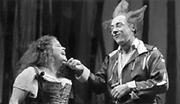WHEN SOMEONE TRIES to defend the latest bit of empty-headed Hollywood nonsense by saying, “It’s no Shakespeare, but . . . ,” they clearly aren’t thinking of As You Like It. Because while Shakespeare at the best of times is no master plotter (think of all those identical twins, unlikely coincidences, and ludicrous reconciliations), this early comedy is far and away the sloppiest work the Bard ever penned. After a first act filled with all sorts of court intrigue, villains, and family strife, the playwright sends his characters off into the bucolic forest of Arden, where they spend the rest of the play falling in love and randomly bumping into each other.
As You Like It
Seattle Repertory Theater until May 25
That’s not to say that it’s an entirely empty-headed affair. Even in this audience-pleasing potboiler (which was cashing in on Thomas Lodge’s popular pastoral poem Rosalynde), Shakespeare has some serious things to say about the potency of two “illusions”—the idea of love at first sight and the dream of living at one with nature. When dashing young Orlando (William Hullings) first meets the courtly Rosalind (Julie Hall, who overcompensates for being a little too old for the role with a lot of girlish giggling), the confines of Duke Fredrick’s oppressive court allow them no expression. It’s only when they both escape to the woods, where the duke’s virtuous brother is already hiding out, that they can truly begin courting in earnest.
BUT DIRECTOR Sharon Ott seems adamant to leave any serious commentary aside in this traditional production that features gorgeous costumes, vast set pieces (including tree branches that move up and down in an entirely gratuitous attempt to indicate “another part of the forest,”) and lots of “hey nonny nonny”-style chortles. The result, while certainly pleasing to the eye and almost ruthlessly high-spirited, does little to conceal that most of this play feels like an unsuccessful trial run for such masterpieces as A Midsummer Night’s Dream and Twelfth Night. With a three-hour running time, that’s a lot of bucolic folderol.
The best things going for this production are two performances: Larry Ballard as the melancholy Jacques and Jeff Steitzer as the court fool Touchstone. Of the two, Steitzer has the harder task, because if there’s an unfunnier part in all of Shakespeare than this particular clown, I can’t think what it would be. But Steitzer adroitly gallops over some diabolically unamusing material about mustard and pancakes and a nonexistent duel, while filling out the role with improvised asides and some sublime physical comedy. Similarly, Ballard is able to tap into a sincere melancholia often found wanting in the half-realized character of Jacques the cynic, which hints that despite all of his wordplay there’s a deep sadness to this man. It’s a performance that makes the rest of the evening, with its lovelorn shepherds and unlikely plot twists, look unavoidably false.








